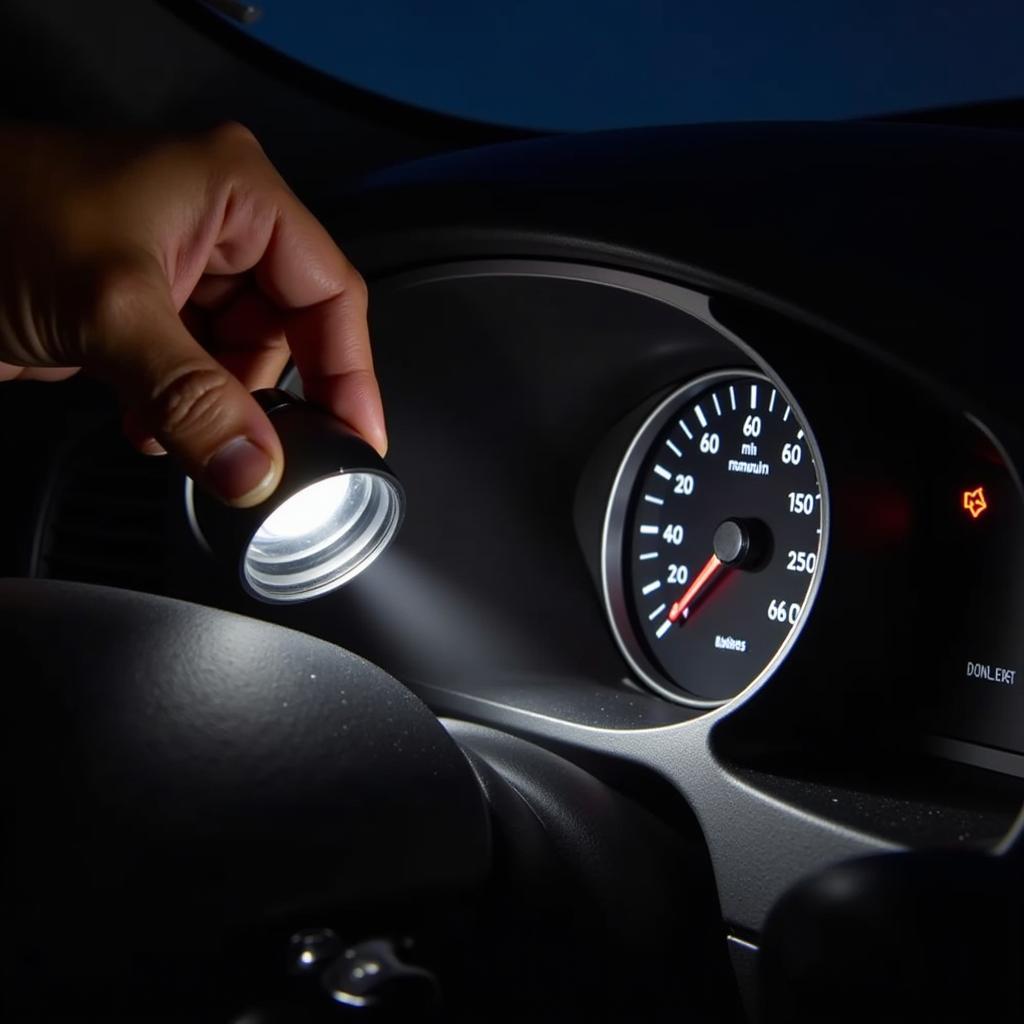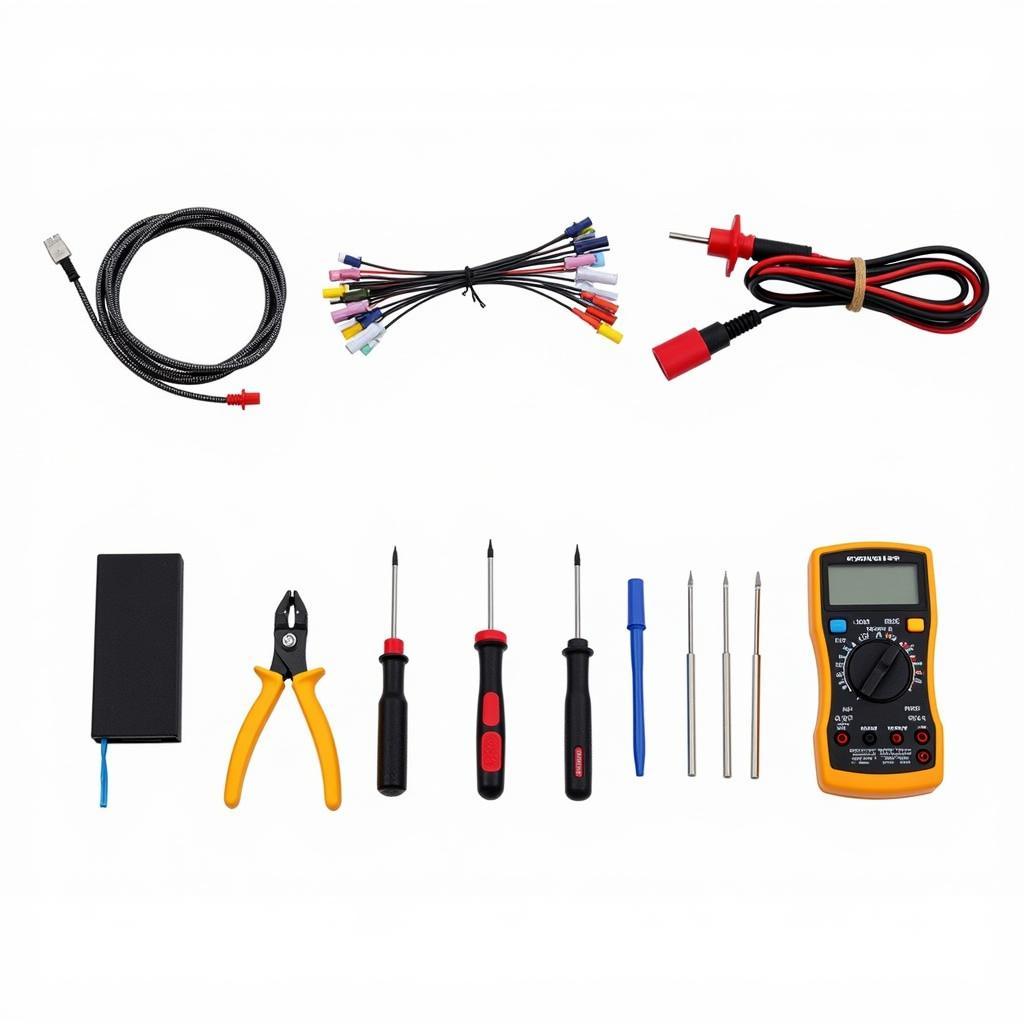A brake warning light illuminating while accelerating can be a disconcerting experience. This issue signifies a potential problem within your braking system and should be addressed promptly. Understanding the underlying causes and solutions can help you take the right steps to ensure your safety and prevent further damage to your vehicle. Let’s delve into the common reasons behind this issue and explore how remote diagnostics and software solutions can play a crucial role in fixing it.
If you’re experiencing this issue with a 2006 Jeep Liberty, check out our guide on brake warning light 2006 jeep liberty.
Common Causes of a Brake Warning Light When Accelerating
Several factors can trigger the brake warning light when you accelerate. Here are some of the most frequent culprits:
- Low Brake Fluid: This is often the primary cause. When brake fluid levels drop below a certain threshold, the sensor triggers the warning light. Leaks in the brake lines, worn brake pads, or a failing master cylinder can contribute to low brake fluid.
- Faulty Brake Sensor: The brake fluid level sensor itself can malfunction, sending a false signal even when the fluid level is adequate.
- Worn Brake Pads: As brake pads wear down, the piston in the caliper extends further to compensate. This can lead to a lower brake fluid level and trigger the warning light, especially when accelerating and the braking system is under increased pressure.
- ABS Issues: Problems with the Anti-lock Braking System (ABS), such as a faulty sensor or module, can illuminate the brake warning light. While this might not directly relate to acceleration, it’s a possibility worth considering.
- Parking Brake Engaged: Sometimes, the simplest explanation is the most likely. Ensure the parking brake is fully disengaged, as a partially engaged brake can trigger the warning light, especially under acceleration.
 Checking Brake Fluid Level
Checking Brake Fluid Level
Diagnosing the Problem
Accurately diagnosing the cause of the brake warning light is crucial. Here’s a step-by-step guide:
- Check the Parking Brake: Make sure the parking brake is fully released.
- Inspect Brake Fluid Level: Carefully examine the brake fluid reservoir. If the level is low, top it off with the correct type of brake fluid recommended by your vehicle manufacturer.
- Visual Inspection: Check for any visible leaks in the brake lines or around the wheels.
- Professional Diagnostics: If the problem persists, seek professional help. Remote diagnostics, programming, and software installations can pinpoint the exact issue and provide efficient solutions.
You can find more information regarding brake pad warnings, specifically for the Range Rover Evoque, at range rover evoque brake pad warning.
Remote Diagnostics and Software Solutions
Remote diagnostics offer a significant advantage in addressing brake warning light issues. This technology allows expert technicians to access your vehicle’s data remotely and perform comprehensive diagnostics. It can identify problems with the ABS module, brake sensors, or other electronic components. Furthermore, remote software installations and programming can fix software glitches that might be triggering the warning light. This eliminates the need for multiple trips to the repair shop, saving you time and money.
Why is My Brake Light Coming on When I Accelerate?
The brake light coming on during acceleration typically indicates a drop in brake fluid level, possibly due to a leak or worn brake pads. The increased pressure during acceleration exacerbates the issue, triggering the warning light. However, a faulty brake sensor or issues with the ABS system can also be responsible.
What Should I do if My Brake Light Comes on While Accelerating?
If your brake light illuminates while accelerating, pull over safely and check your parking brake. Inspect the brake fluid level and top it up if necessary. If the problem persists, consult a professional for further diagnosis. You might also find information helpful regarding a Prius temporary brake warning at prius temporary brake warning.
“Regular maintenance and timely attention to warning lights are crucial for maintaining optimal braking performance and ensuring safety,” says John Davis, Senior Automotive Diagnostic Technician at Advanced Auto Solutions.
Conclusion
Addressing a brake warning light when accelerating is crucial for ensuring safe vehicle operation. By understanding the common causes and utilizing professional remote diagnostics and software solutions, you can effectively resolve the issue and prevent further damage. Don’t ignore this critical warning sign. Addressing it promptly can prevent costly repairs and, most importantly, ensure your safety on the road. You may also be interested in learning about warning signs involving both the brake and battery light, especially in a Nissan Murano, by visiting warning sign brake and battery light nissan murano.
If your brake warning light comes on when accelerating, you should consult a professional. You can learn more about this issue at brake warning light comes on when accelerating.
FAQ
- Can I drive with the brake warning light on? It’s not recommended. The light indicates a potential problem with your braking system, which could compromise your safety.
- How much does it cost to fix a brake warning light issue? The cost varies depending on the underlying cause. A simple brake fluid top-up might be inexpensive, while repairs to the ABS system can be more costly.
- Can I fix the brake warning light issue myself? While you can perform basic checks like checking the brake fluid level and parking brake, it’s best to consult a professional for accurate diagnosis and repair.
- How often should I check my brake fluid level? It’s a good practice to check your brake fluid level at least once a month.
- What type of brake fluid should I use? Consult your vehicle’s owner’s manual for the recommended brake fluid type. Using the wrong type can damage your braking system.
- What is remote diagnostics? Remote diagnostics allows technicians to access your vehicle’s data remotely, providing efficient and accurate diagnosis.
- Is remote software installation safe for my car? Yes, remote software installation performed by qualified professionals is safe and can effectively address software-related issues.


